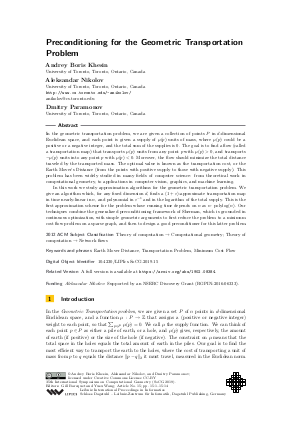Preconditioning for the Geometric Transportation Problem
Authors Andrey Boris Khesin, Aleksandar Nikolov, Dmitry Paramonov
-
Part of:
Volume:
35th International Symposium on Computational Geometry (SoCG 2019)
Part of: Series: Leibniz International Proceedings in Informatics (LIPIcs)
Part of: Conference: Symposium on Computational Geometry (SoCG) - License:
 Creative Commons Attribution 3.0 Unported license
Creative Commons Attribution 3.0 Unported license
- Publication Date: 2019-06-11
File

PDF
LIPIcs.SoCG.2019.15.pdf
- Filesize: 0.53 MB
- 14 pages
Document Identifiers
Related Versions
-
A full version is available at https://arxiv.org/abs/1902.08384.
Subject Classification
ACM Subject Classification
- Theory of computation → Computational geometry
- Theory of computation → Network flows
Keywords
- Earth Mover Distance
- Transportation Problem
- Minimum Cost Flow
Metrics
- Access Statistics
-
Total Accesses (updated on a weekly basis)
0Document
0Metadata
Abstract
In the geometric transportation problem, we are given a collection of points P in d-dimensional Euclidean space, and each point is given a supply of mu(p) units of mass, where mu(p) could be a positive or a negative integer, and the total sum of the supplies is 0. The goal is to find a flow (called a transportation map) that transports mu(p) units from any point p with mu(p) > 0, and transports -mu(p) units into any point p with mu(p) < 0. Moreover, the flow should minimize the total distance traveled by the transported mass. The optimal value is known as the transportation cost, or the Earth Mover’s Distance (from the points with positive supply to those with negative supply). This problem has been widely studied in many fields of computer science: from theoretical work in computational geometry, to applications in computer vision, graphics, and machine learning.
In this work we study approximation algorithms for the geometric transportation problem. We give an algorithm which, for any fixed dimension d, finds a (1+epsilon)-approximate transportation map in time nearly-linear in n, and polynomial in epsilon^{-1} and in the logarithm of the total supply. This is the first approximation scheme for the problem whose running time depends on n as n * polylog(n). Our techniques combine the generalized preconditioning framework of Sherman, which is grounded in continuous optimization, with simple geometric arguments to first reduce the problem to a minimum cost flow problem on a sparse graph, and then to design a good preconditioner for this latter problem.
Cite As Get BibTex
Andrey Boris Khesin, Aleksandar Nikolov, and Dmitry Paramonov. Preconditioning for the Geometric Transportation Problem. In 35th International Symposium on Computational Geometry (SoCG 2019). Leibniz International Proceedings in Informatics (LIPIcs), Volume 129, pp. 15:1-15:14, Schloss Dagstuhl – Leibniz-Zentrum für Informatik (2019)
https://doi.org/10.4230/LIPIcs.SoCG.2019.15
BibTex
@InProceedings{khesin_et_al:LIPIcs.SoCG.2019.15,
author = {Khesin, Andrey Boris and Nikolov, Aleksandar and Paramonov, Dmitry},
title = {{Preconditioning for the Geometric Transportation Problem}},
booktitle = {35th International Symposium on Computational Geometry (SoCG 2019)},
pages = {15:1--15:14},
series = {Leibniz International Proceedings in Informatics (LIPIcs)},
ISBN = {978-3-95977-104-7},
ISSN = {1868-8969},
year = {2019},
volume = {129},
editor = {Barequet, Gill and Wang, Yusu},
publisher = {Schloss Dagstuhl -- Leibniz-Zentrum f{\"u}r Informatik},
address = {Dagstuhl, Germany},
URL = {https://drops.dagstuhl.de/entities/document/10.4230/LIPIcs.SoCG.2019.15},
URN = {urn:nbn:de:0030-drops-104190},
doi = {10.4230/LIPIcs.SoCG.2019.15},
annote = {Keywords: Earth Mover Distance, Transportation Problem, Minimum Cost Flow}
}
Author Details
Funding
- Nikolov, Aleksandar: Supported by an NSERC Discovery Grant (RGPIN-2016-06333).
References
-
Pankaj K. Agarwal, Kyle Fox, Debmalya Panigrahi, Kasturi R. Varadarajan, and Allen Xiao. Faster Algorithms for the Geometric Transportation Problem. In Symposium on Computational Geometry, volume 77 of LIPIcs, pages 7:1-7:16. Schloss Dagstuhl - Leibniz-Zentrum fuer Informatik, 2017.

-
Pankaj K. Agarwal and R. Sharathkumar. Approximation algorithms for bipartite matching with metric and geometric costs. In STOC, pages 555-564. ACM, 2014.

-
Jason Altschuler, Francis Bach, Alessandro Rudi, and Jonathan Weed. Approximating the Quadratic Transportation Metric in Near-Linear Time. CoRR, abs/1810.10046, 2018.

-
Alexandr Andoni, Aleksandar Nikolov, Krzysztof Onak, and Grigory Yaroslavtsev. Parallel algorithms for geometric graph problems. In STOC, pages 574-583. ACM, 2014.

-
Sanjeev Arora. Polynomial Time Approximation Schemes for Euclidean Traveling Salesman and other Geometric Problems. J. ACM, 45(5):753-782, 1998.

- Nicolas Bonneel, Michiel van de Panne, Sylvain Paris, and Wolfgang Heidrich. Displacement Interpolation Using Lagrangian Mass Transport. ACM Trans. Graph., 30(6):158:1-158:12, December 2011. URL: http://dx.doi.org/10.1145/2070781.2024192.
-
Moses Charikar. Similarity estimation techniques from rounding algorithms. In STOC, pages 380-388. ACM, 2002.

- Michael L. Fredman, János Komlós, and Endre Szemerédi. Storing a sparse table with O(1) worst case access time. J. Assoc. Comput. Mach., 31(3):538-544, 1984. URL: http://dx.doi.org/10.1145/828.1884.
-
Panos Giannopoulos and Remco C Veltkamp. A pseudo-metric for weighted point sets. In European Conference on Computer Vision, pages 715-730. Springer, 2002.

-
Kristen Grauman and Trevor Darrell. Fast contour matching using approximate earth mover’s distance. In Computer Vision and Pattern Recognition, 2004. CVPR 2004. Proceedings of the 2004 IEEE Computer Society Conference on, volume 1, pages I-I. IEEE, 2004.

-
Piotr Indyk. A near linear time constant factor approximation for Euclidean bichromatic matching (cost). In SODA, pages 39-42. SIAM, 2007.

-
Piotr Indyk and Nitin Thaper. Fast Image Retrieval via Embeddings. In 3rd International Workshop on Statistical and Computational Theories of Vision, 2003.

- Qin Lv, Moses Charikar, and Kai Li. Image Similarity Search with Compact Data Structures. In Proceedings of the Thirteenth ACM International Conference on Information and Knowledge Management, CIKM '04, pages 208-217, New York, NY, USA, 2004. ACM. URL: http://dx.doi.org/10.1145/1031171.1031213.
-
Jeff M. Phillips and Pankaj K. Agarwal. On Bipartite Matching under the RMS Distance. In CCCG, 2006.

-
Yossi Rubner, Carlo Tomasi, and Leonidas J Guibas. The earth mover’s distance as a metric for image retrieval. International journal of computer vision, 40(2):99-121, 2000.

-
R. Sharathkumar and Pankaj K. Agarwal. A near-linear time ε-approximation algorithm for geometric bipartite matching. In STOC, pages 385-394. ACM, 2012.

-
R. Sharathkumar and Pankaj K. Agarwal. Algorithms for the transportation problem in geometric settings. In SODA, pages 306-317. SIAM, 2012.

-
Jonah Sherman. Generalized Preconditioning and Undirected Minimum-Cost Flow. In SODA, pages 772-780. SIAM, 2017.

- Cédric Villani. Topics in optimal transportation, volume 58 of Graduate Studies in Mathematics. American Mathematical Society, Providence, RI, 2003. URL: http://dx.doi.org/10.1007/b12016.
